
tom_i
-
Posts
55 -
Joined
-
Last visited
Content Type
Forums
Store
Crowdfunding
Applications
Events
Raffles
Community Map
Posts posted by tom_i
-
-
Same for me.
Installed
QuoteArmbian_24.8.4_Rock-5c_bookworm_vendor_6.1.75-backported-mesa.img
to eMMc card, installation / configuration for 1st time without problem also with using WIFI connection.
List of modules after installation:
Then after apt update/upgrade wifi stop working, module was not found or somehow broken.
What I found out, that upgrade Armbian deletes all aic8800 modules:
After rebooting system, modules were not loaded and modprobe of them don't work either.
Upgrade installs newer versions of
Quotelinux-headers-vendor-rk35xx
linux-image-vendor-rk35xx
linux-dtb-vendor-rk35xx
to version 24.11.1 from 24.8.4
-
Cool.. thx 🙂
-
Where to find u-boot files?
Download link from source page for EspressoBin doesn't work: https://www.armbian.com/espressobin/
gets you here:
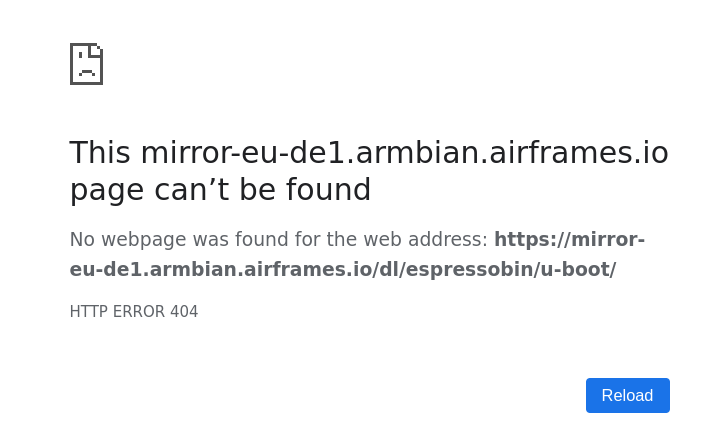
-
-
Can anyone help me?
I'm stuck here with creating LVM for my NAS :-/
-
-
Hi I would like to use LVM on my 2TB HDD.
I'm working on:
_____ _ _ | ____|___ _ __ _ __ ___ ___ ___ ___ | |__ (_)_ __ | _| / __| '_ \| '__/ _ \/ __/ __|/ _ \| '_ \| | '_ \ | |___\__ \ |_) | | | __/\__ \__ \ (_) | |_) | | | | | |_____|___/ .__/|_| \___||___/___/\___/|_.__/|_|_| |_| |_| Welcome to ARMBIAN 5.54 stable Debian GNU/Linux 9 (stretch) 4.17.9-mvebu64 $ lsb_release -a No LSB modules are available. Distributor ID: Debian Description: Debian GNU/Linux 9.5 (stretch) Release: 9.5 Codename: stretchPhysical device:
Disk /dev/sda: 1.8 TiB, 2000398934016 bytes, 3907029168 sectors Units: sectors of 1 * 512 = 512 bytes Sector size (logical/physical): 512 bytes / 4096 bytes I/O size (minimum/optimal): 4096 bytes / 4096 bytesPV and VG have been created without problem:
$ sudo pvdisplay --- Physical volume --- PV Name /dev/sda VG Name multimedia PV Size 1.82 TiB / not usable 1.09 MiB Allocatable yes PE Size 4.00 MiB Total PE 476932 Free PE 476932 Allocated PE 0 PV UUID fTPV4K-z5Vo-e7WS-01RI-ripP-g5Eg-vBsDL3 $ sudo vgdisplay --- Volume group --- VG Name multimedia System ID Format lvm2 Metadata Areas 1 Metadata Sequence No 1 VG Access read/write VG Status resizable MAX LV 0 Cur LV 0 Open LV 0 Max PV 0 Cur PV 1 Act PV 1 VG Size 1.82 TiB PE Size 4.00 MiB Total PE 476932 Alloc PE / Size 0 / 0 Free PE / Size 476932 / 1.82 TiB VG UUID PthfmW-0SfB-GYsy-rkgu-yOBl-Ca1B-0xiZWsAfter I want to create LV it shows me this message:
$ sudo lvcreate --name video --size 1.8T multimedia /dev/mapper/control: open failed: No such device Failure to communicate with kernel device-mapper driver. Check that device-mapper is available in the kernel. Incompatible libdevmapper 1.02.137 (2016-11-30) and kernel driver (unknown version). striped: Required device-mapper target(s) not detected in your kernel. Run `lvcreate --help' for more information.libdevmapper:
$ sudo aptitude show libdevmapper1.02.1 Package: libdevmapper1.02.1 Version: 2:1.02.137-2 State: installed Automatically installed: no Multi-Arch: same Priority: optional Section: libs Maintainer: Debian LVM Team <pkg-lvm-maintainers@lists.alioth.debian.org> Architecture: arm64 Uncompressed Size: 378 k Depends: libc6 (>= 2.22), libselinux1 (>= 1.32), libudev1 (>= 183), dmsetup (>= 2:1.02.137-2) Conflicts: libdevmapper1.02 Breaks: liblvm2app2.2 (< 2.02.122), lvm2 (< 2.02.122), lvm2:armhf (< 2.02.122), liblvm2app2.2:armhf (< 2.02.122), libdevmapper1.02.1:armhf (!= 2:1.02.137-2) Replaces: libdevmapper1.02.1:armhf (< 2:1.02.137-2) Description: Linux Kernel Device Mapper userspace library Homepage: http://sources.redhat.com/lvm2/ Tags: role::shared-lib
$ sudo aptitude search mapper p keymapper - Keyboard map decision tree builder and interpreter p libdevmapper-dev - Linux Kernel Device Mapper header files p libdevmapper-dev:armhf - Linux Kernel Device Mapper header files i A libdevmapper-event1.02.1 - Linux Kernel Device Mapper event support library p libdevmapper-event1.02.1:armhf - Linux Kernel Device Mapper event support library i libdevmapper1.02.1 - Linux Kernel Device Mapper userspace library p libdevmapper1.02.1:armhf - Linux Kernel Device Mapper userspace library p openorienteering-mapper - Orienteering map drawing application p openorienteering-mapper:armhf - Orienteering map drawing application p puppet-module-adrienthebo-filemapper - Puppet module for mapping files to resources and back p virtuoso-vad-rdfmappers - high-performance database - RDF mappers module$ sudo aptitude show dmsetup Package: dmsetup Version: 2:1.02.137-2 State: installed Automatically installed: no Multi-Arch: foreign Priority: optional Section: admin Maintainer: Debian LVM Team <pkg-lvm-maintainers@lists.alioth.debian.org> Architecture: arm64 Uncompressed Size: 242 k Depends: libc6 (>= 2.17), libdevmapper1.02.1 (>= 2:1.02.131) Conflicts: dmsetup:armhf Provides: dmsetup:armhf (= 2:1.02.137-2) Provided by: dmsetup:armhf (2:1.02.137-2) Description: Linux Kernel Device Mapper userspace library Homepage: http://sources.redhat.com/lvm2/ Tags: admin::filesystem, implemented-in::c, interface::commandline, role::program, scope::utility, use::configuring
$ ls -l /sys/class/misc/ total 0 lrwxrwxrwx 1 root root 0 Jan 1 1970 autofs -> ../../devices/virtual/misc/autofs lrwxrwxrwx 1 root root 0 Jan 1 1970 btrfs-control -> ../../devices/virtual/misc/btrfs-control lrwxrwxrwx 1 root root 0 Jan 1 1970 cpu_dma_latency -> ../../devices/virtual/misc/cpu_dma_latency lrwxrwxrwx 1 root root 0 Jan 1 1970 hw_random -> ../../devices/virtual/misc/hw_random lrwxrwxrwx 1 root root 0 Jan 1 1970 kvm -> ../../devices/virtual/misc/kvm lrwxrwxrwx 1 root root 0 Jan 1 1970 lightnvm -> ../../devices/virtual/misc/lightnvm lrwxrwxrwx 1 root root 0 Jan 1 1970 loop-control -> ../../devices/virtual/misc/loop-control lrwxrwxrwx 1 root root 0 Jan 1 1970 memory_bandwidth -> ../../devices/virtual/misc/memory_bandwidth lrwxrwxrwx 1 root root 0 Jan 1 1970 network_latency -> ../../devices/virtual/misc/network_latency lrwxrwxrwx 1 root root 0 Jan 1 1970 network_throughput -> ../../devices/virtual/misc/network_throughput lrwxrwxrwx 1 root root 0 Jan 1 1970 psaux -> ../../devices/virtual/misc/psaux lrwxrwxrwx 1 root root 0 Jan 1 1970 snapshot -> ../../devices/virtual/misc/snapshot lrwxrwxrwx 1 root root 0 Jan 1 1970 tun -> ../../devices/virtual/misc/tun lrwxrwxrwx 1 root root 0 Jan 1 1970 ubi_ctrl -> ../../devices/virtual/misc/ubi_ctrl lrwxrwxrwx 1 root root 0 Jan 1 1970 vfio -> ../../devices/virtual/misc/vfio lrwxrwxrwx 1 root root 0 Jan 1 1970 vga_arbiter -> ../../devices/virtual/misc/vga_arbiter lrwxrwxrwx 1 root root 0 Jan 1 1970 vhost-net -> ../../devices/virtual/misc/vhost-net $ cat /proc/devices Character devices: 1 mem 2 pty 3 ttyp 4 /dev/vc/0 4 tty 4 ttyS 5 /dev/tty 5 /dev/console 5 /dev/ptmx 7 vcs 10 misc 13 input 29 fb 89 i2c 90 mtd 128 ptm 136 pts 180 usb 189 usb_device 243 rpmb 244 vfio 245 macvtap 246 nvme 247 bsg 248 ptp 249 pps 250 rtc 251 dax 252 ttyMV 253 ttyPS 254 gpiochip Block devices: 1 ramdisk 7 loop 8 sd 31 mtdblock 65 sd 66 sd 67 sd 68 sd 69 sd 70 sd 71 sd 128 sd 129 sd 130 sd 131 sd 132 sd 133 sd 134 sd 135 sd 179 mmc 253 zram 254 virtblk 259 blkextTrying to add module:
$ sudo modprobe dm_mod modprobe: FATAL: Module dm_mod not found in directory /lib/modules/4.17.9-mvebu64$ find /lib/modules/4.17.9-mvebu64/kernel/drivers/ -iname "dm*" /lib/modules/4.17.9-mvebu64/kernel/drivers/dma /lib/modules/4.17.9-mvebu64/kernel/drivers/hwmon/dme1737.ko /lib/modules/4.17.9-mvebu64/kernel/drivers/net/usb/dm9601.koHave I missed something?
I've went through official LVM howto here, but maybe it's too old and I don't know specific right module name.
Thx for help..
-
On 7/23/2018 at 8:09 AM, ebin-dev said:
@Igor can you move this to peer-to-peer technical support please ?
It seems that your installation is a mess. To boot from scsi is not officially supported yet. You can make it work but you need to understand what you do.
After copying your working installation from SD to SSD using nand-sata-install you still need to manually copy /boot to /dev/sda1/ and to adapt the content of /dev/sda1/etc/fstab (rootdev UUID ; delete /boot entry ). You should also adapt the content of /dev/sda1/boot/armbianEnv.txt (rootdev UUID) and the content of /dev/sda1/boot/boot.cmd (setenv rootdev "/dev/sda1") followed by ‘mkimage -C none -A arm -T script -d boot.cmd boot.scr‘ to avoid any future mess. Then change your environment settings to boot from sata via SPI:
setenv boot_interface scsi setenv image_name boot/Image setenv fdt_name boot/dtb/marvell/armada-3720-espressobin.dtb setenv fdt_high "0xffffffffffffffff" setenv rootdev "/dev/sda1" setenv root root=/dev/sda1 rw setenv rootfstype "ext4" setenv verbosity "1" setenv initrd_addr "0x1100000" setenv initrd_image "boot/uInitrd" setenv ethaddr "XX:XX:XX:XX:XX:XX" setenv bootcmd 'scsi scan; scsi dev 0; ext4load scsi 0:1 $kernel_addr $image_name;ext4load scsi 0:1 $initrd_addr $initrd_image; ext4load scsi 0:1 $fdt_addr $fdt_name;setenv bootargs $console root=$rootdev rw rootwait; booti $kernel_addr $initrd_addr $fdt_addr'Thank you @ebin-dev for your support. Everything works pretty well now

-
-
Ok another problem :-/
I've run "update" & "upgrade" of espressoBin, it downloads 4.17.5 kernel as I remember correctly.Then I've reboot it, but strange was, that it's booted to 4.17.3 not .5, IP adress was different from previous too. I was surprised little bit, but everything works after many restarts.
So I halted EB and then run it again.
But now, it shows me that I have "Bad Linux ARM64 Image magic!"
Maybe tomorrow, I'll try to replace that installation on SSD via uSDHC again.
Because I have correct ENV in u-boot now, so maybe that was the reason of bad patching kernel or... I don't know.. just quessing.
PS: just for sure my newer and saved ENV:
printenv baudrate=115200 boot=interface scsi boot_interface=usb bootargs=console=ttyMV0,115200 earlycon=ar3700_uart,0xd0012000 root=/dev/sdc1 rw ip=0.0.0.0:0.0.0.0:10.4.50.254:255.255.255.0:marvell:eth0:none nfsroot=0.0.0.0:/srv/nfs/ bootcmd=run get_images; run set_bootargs; run load_script;booti $kernel_addr $ramfs_addr $fdt_addr bootdelay=2 console=console=ttyMV0,115200 earlycon=ar3700_uart,0xd0012000 eth1addr=00:XX:XX:XX:XX:01 eth2addr=00:XX:XX:XX:XX:02 eth3addr=00:XX:XX:XX:XX:03 ethact=neta@30000 ethaddr=F0:XX:XX:XX:XX:F2 ethprime=eth0 fdt_addr=0x4f00000 fdt_high=0xffffffffffffffff fdt_name=boot/dtb/marvell/armada-3720-db.dtb fdt_name_a=boot/dtb/marvell/armada-3720-db.dtb fdt_name_b=boot/dtb/marvell/armada-3720-espressobin.dtb fdtcontroladdr=7f7182d8 gatewayip=10.4.50.254 get_images=tftpboot $kernel_addr $image_name; tftpboot $fdt_addr $fdt_name; run get_ramfs get_ramfs=if test "${ramfs_name}" != "-"; then setenv ramfs_addr 0x8000000; tftpboot $ramfs_addr $ramfs_name; else setenv ramfs_addr -;fi hostname=marvell image_name=boot/Image initrd_addr=0x1100000 initrd_image=boot/uInitrd initrd_size=0x2000000 ipaddr=0.0.0.0 kernel_addr=0x5000000 load_script=if test -e mmc 0:1 boot/boot.scr; then echo "... booting from SD";setenv boot_interface mmc;else echo "... booting from USB/SATA";usb start;setenv boot_interface usb;fi;if test -e $boot_interface 0:1 boot/boot.scr;then ext4load $boot_interface 0:1 0x00800000 boot/boot.scr; source; fi loadaddr=0x5000000 netdev=eth0 netmask=255.255.255.0 ramfs_addr=- ramfs_name=- root=root=/dev/sdc1 rw rootdev=/dev/sdc1 rootfstype=ext4 rootpath=/srv/nfs/ serverip=0.0.0.0 set_bootargs=setenv bootargs $console $root ip=$ipaddr:$serverip:$gatewayip:$netmask:$hostname:$netdev:none nfsroot=$serverip:$rootpath $extra_params stderr=serial@12000 stdin=serial@12000 stdout=serial@12000 verbosity=1 Environment size: 1933/65532 bytes -
Fresh install via "nand-sata-install" from uSDHC card and network still doesn't work.
I'm on:
lsb_release -a No LSB modules are available. Distributor ID: Debian Description: Debian GNU/Linux 9.4 (stretch) Release: 9.4 Codename: stretch
cat /proc/version Linux version 4.17.3-mvebu64 (root@armbian) (gcc version 7.2.1 20171011 (Linaro GCC 7.2-2017.11)) #7 SMP PREEMPT Thu Jun 28 18:21:11 UTC 2018systemd --v systemd 232 +PAM +AUDIT +SELINUX +IMA +APPARMOR +SMACK +SYSVINIT +UTMP +LIBCRYPTSETUP +GCRYPT +GNUTLS +ACL +XZ +LZ4 +SECCOMP +BLKID +ELFUTILS +KMOD +IDNArmbian boots very well, no issues have been detected via starting up. Unfortunatelly, there are missing "lan0" and "lan1" devices in "ip a"
ip a 1: lo: <LOOPBACK,UP,LOWER_UP> mtu 65536 qdisc noqueue state UNKNOWN group default qlen 1000 link/loopback 00:00:00:00:00:00 brd 00:00:00:00:00:00 inet 127.0.0.1/8 scope host lo valid_lft forever preferred_lft forever 2: bond0: <BROADCAST,MULTICAST,MASTER> mtu 1500 qdisc noop state DOWN group default qlen 1000 link/ether 1e:XX:XX:XX:XX:43 brd ff:ff:ff:ff:ff:ff 3: dummy0: <BROADCAST,NOARP> mtu 1500 qdisc noop state DOWN group default qlen 1000 link/ether fe:XX:XX:XX:XX:de brd ff:ff:ff:ff:ff:ff 4: eth0: <BROADCAST,MULTICAST> mtu 1500 qdisc noop state DOWN group default qlen 532 link/ether f0:XX:XX:XX:XX:f2 brd ff:ff:ff:ff:ff:ff 5: eth1: <BROADCAST,MULTICAST> mtu 1500 qdisc noop state DOWN group default qlen 532 link/ether 9a:XX:XX:XX:XX:c9 brd ff:ff:ff:ff:ff:ff 6: br0: <NO-CARRIER,BROADCAST,MULTICAST,UP> mtu 1500 qdisc noqueue state DOWN group default qlen 1000 link/ether 4e:XX:XX:XX:XX:43 brd ff:ff:ff:ff:ff:ff
/etc/systemd/network$ ls -l total 24 -rw-r--r-- 1 root root 30 Jun 28 20:31 10-br0.netdev -rw-r--r-- 1 root root 38 Jun 28 20:31 10-br0.network -rw-r--r-- 1 root root 40 Jun 28 20:31 10-eth0.network -rw-r--r-- 1 root root 40 Jun 28 20:31 10-lan0.network -rw-r--r-- 1 root root 40 Jun 28 20:31 10-lan1.network -rw-r--r-- 1 root root 40 Jun 28 20:31 10-wan.network cat * [NetDev] Name=br0 Kind=bridge [Match] Name=br0 [Network] DHCP=ipv4 [Match] Name=eth0 [Network] DHCP=ipv4 [Match] Name=lan0 [Network] Bridge=br0 [Match] Name=lan1 [Network] Bridge=br0 [Match] Name=wan [Network] Bridge=br0
Weird is that if I boot via uSDHC card, network works without problem, but after "nand-sata-install" to SSD network doesn't work.
I've tried to use "armbian-config" to setup DHCP again = no help.
Any ideas?
EDIT
Problem solved.
I had to use all that setenv params from official wiki:
setenv load_script 'if test -e mmc 0:1 boot/boot.scr; then echo \"... booting from SD\";setenv boot_interface mmc;else echo \"... booting from USB/SATA\";usb start;setenv boot_interface usb;fi;if test -e \$boot_interface 0:1 boot/boot.scr;then ext4load \$boot_interface 0:1 0x00800000 boot/boot.scr; source; fi' setenv bootcmd 'run get_images; run set_bootargs; run load_script;booti \$kernel_addr \$ramfs_addr \$fdt_addr'After that network is working.
-
15 minutes ago, Igor said:
Debian testing is not supported. We have enough problems without that. You are welcome to discuss this further in the general area.
Aha.. ok. Thx
-
43 minutes ago, ebin-dev said:
You are on Debian buster testing - that causes your problem.
Is there a reason why you are not using Debian stretch mainline/stable ? The interfaces are up and running:
# ip addr show 1: lo: <LOOPBACK,UP,LOWER_UP> mtu 65536 qdisc noqueue state UNKNOWN group default qlen 1000 link/loopback 00:00:00:00:00:00 brd 00:00:00:00:00:00 inet 127.0.0.1/8 scope host lo valid_lft forever preferred_lft forever 2: bond0: <BROADCAST,MULTICAST,MASTER> mtu 1500 qdisc noop state DOWN group default qlen 1000 link/ether XX:XX:XX:XX:XX:XX brd ff:ff:ff:ff:ff:ff 3: dummy0: <BROADCAST,NOARP> mtu 1500 qdisc noop state DOWN group default qlen 1000 link/ether XX:XX:XX:XX:XX:XX brd ff:ff:ff:ff:ff:ff 4: eth0: <BROADCAST,MULTICAST,UP,LOWER_UP> mtu 1500 qdisc mq state UP group default qlen 532 link/ether XX:XX:XX:XX:XX:XX brd ff:ff:ff:ff:ff:ff 5: wan@eth0: <BROADCAST,MULTICAST,UP,LOWER_UP> mtu 1500 qdisc noqueue master br0 state UP group default qlen 1000 link/ether XX:XX:XX:XX:XX:XX brd ff:ff:ff:ff:ff:ff 6: lan0@eth0: <NO-CARRIER,BROADCAST,MULTICAST,UP> mtu 1500 qdisc noqueue master br0 state LOWERLAYERDOWN group default qlen 1000 link/ether XX:XX:XX:XX:XX:XX brd ff:ff:ff:ff:ff:ff 7: lan1@eth0: <NO-CARRIER,BROADCAST,MULTICAST,UP> mtu 1500 qdisc noqueue master br0 state LOWERLAYERDOWN group default qlen 1000 link/ether XX:XX:XX:XX:XX:XX brd ff:ff:ff:ff:ff:ff 8: br0: <BROADCAST,MULTICAST,UP,LOWER_UP> mtu 1500 qdisc noqueue state UP group default qlen 1000 link/ether XX:XX:XX:XX:XX:XX brd ff:ff:ff:ff:ff:ff inet 192.168.xx.yy/24 brd 192.168.xx.255 scope global dynamic br0 valid_lft 861638sec preferred_lft 861638sec inet6 2a02:810d:1500:7c44:f2ad:4eff:xxxx:yyyy/64 scope global mngtmpaddr noprefixroute dynamic valid_lft 5214sec preferred_lft 2514sec inet6 fe80::f2ad:4eff:xxxx:yyyy/64 scope link valid_lft forever preferred_lft forever
I've seen that 4.17.X kernel has more features for EspressoBin so I wanted to switch to the NEXT. Ddebian Stretch has 4.4. right?
-
53 minutes ago, ebin-dev said:
You should not change the content of /etc/network/interfaces if you use systemd-networkd. If it is of some help for you - see my configuration below:
# cat /etc/network/interfaces # interfaces(5) file used by ifup(8) and ifdown(8) auto lo iface lo inet loopback # cd /etc/systemd/network # ls 10-br0.netdev 10-br0.network 10-eth0.network 10-lan0.network 10-lan1.network 10-wan.network # cat * [NetDev] Name=br0 Kind=bridge MACAddress=XX:XX:XX:XX:XX:XX [Match] Name=br0 [Network] DHCP=ipv4 [Match] Name=eth0 [Network] DHCP=ipv4 [Match] Name=lan0 [Network] Bridge=br0 [Match] Name=lan1 [Network] Bridge=br0 [Match] Name=wan [Network] Bridge=br0Same for me man.
My ip addr show:
nashome@espressobin:/etc/systemd/network$ ip addr show 1: lo: <LOOPBACK,UP,LOWER_UP> mtu 65536 qdisc noqueue state UNKNOWN group default qlen 1000 link/loopback 00:00:00:00:00:00 brd 00:00:00:00:00:00 inet 127.0.0.1/8 scope host lo valid_lft forever preferred_lft forever inet6 ::1/128 scope host valid_lft forever preferred_lft forever 2: bond0: <BROADCAST,MULTICAST,MASTER> mtu 1500 qdisc noop state DOWN group default qlen 1000 link/ether XX:XX:XX:XX:XX:XX brd ff:ff:ff:ff:ff:ff 3: dummy0: <BROADCAST,NOARP> mtu 1500 qdisc noop state DOWN group default qlen 1000 link/ether XX:XX:XX:XX:XX:XX brd ff:ff:ff:ff:ff:ff 4: eth0: <BROADCAST,MULTICAST> mtu 1500 qdisc noop state DOWN group default qlen 532 link/ether XX:XX:XX:XX:XX:XX brd ff:ff:ff:ff:ff:ff 5: eth1: <BROADCAST,MULTICAST> mtu 1500 qdisc noop state DOWN group default qlen 532 link/ether XX:XX:XX:XX:XX:XX brd ff:ff:ff:ff:ff:ff 6: br0: <NO-CARRIER,BROADCAST,MULTICAST,UP> mtu 1500 qdisc noqueue state DOWN group default qlen 1000 link/ether XX:XX:XX:XX:XX:XX brd ff:ff
So no lan0, lan1 are up, so maybe that's the reason it doesn't work.
-
Hi @ebin-dev I'm on Debian too:
Linux version 4.17.5-mvebu64 (root@nightly) (gcc version 7.2.1 20171011 (Linaro GCC 7.2-2017.11)) #87 SMP PREEMPT Sun Jul 8 19:16:19 UTC 2018 lsb_release -a No LSB modules are available. Distributor ID: Debian Description: Debian GNU/Linux testing (buster) Release: testing Codename: busterIt shows me some messages about eth0:
[ 2868.894331] mvneta d0030000.ethernet eth0: could not attach PHY: -19 [ 2868.898077] mvneta d0030000.ethernet eth0: cannot probe MDIO busIs there any way, how to debug this?
I've tried to define eth0 with DHCP in "/etc/network/interfaces", or run "sudo dhclient eth0".
Both with no luck

-
14 hours ago, tkaiser said:
Boots even from SATA disks behind a crappy SATA PM.
Ok thx, fortunatelly my board works pretty well

Anyway, my network manager doesn't work as I switched from 4.4. kernel to the next 4.17.5.
It shows me just:
sudo journalctl -u systemd-networkd-wait-online.service - [sudo] password for nashome: -- Logs begin at Sat 2018-07-21 09:50:37 UTC, end at Sat 2018-07-21 09:57:12 UTC Jul 21 09:50:40 espressobin systemd[1]: Starting Wait for Network to be Configur Jul 21 09:52:40 espressobin systemd-networkd-wait-online[566]: Event loop failed Jul 21 09:52:40 espressobin systemd[1]: systemd-networkd-wait-online.service: Ma Jul 21 09:52:40 espressobin systemd[1]: systemd-networkd-wait-online.service: Fa Jul 21 09:52:40 espressobin systemd[1]: Failed to start Wait for Network to be C
Because I'm connected it through "screen" so it looks that it break lines of that log :-/
-
Hi,
still no support for booting from SATA?
-
-
$ sudo apt-get install armbian-config [sudo] password for XXX: Reading package lists... Done Building dependency tree Reading state information... Done Package armbian-config is not available, but is referred to by another package. This may mean that the package is missing, has been obsoleted, or is only available from another source E: Package 'armbian-config' has no installation candidateHmm... no way :-/
Looks like, mine Armbian is deeper and deeper in huge mess :-/
-
Wierd:
$ sudo armbian-config sudo: armbian-config: command not foundHow is it possible?
Just firmware update and ```sudo apt update && sudo apt upgrade``` commands were running there.
-
Mine looks shorter :-O
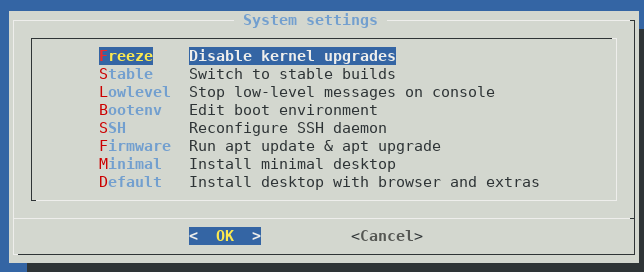
-
-
Nn, I'm using ssh over `tilda` linux terminal manager, but if I've tried `konsole`, result is same. I see whole menu there, so no gaps or hidden menu for me :-/
Maybe just one solution should be to install completely new image on my SSD :-/
-
You meant 'spacebar' key? It doesn't help, it normal enter to ther `Stable` menu.
Maybe I have it somehow "broken" or so.. :-/

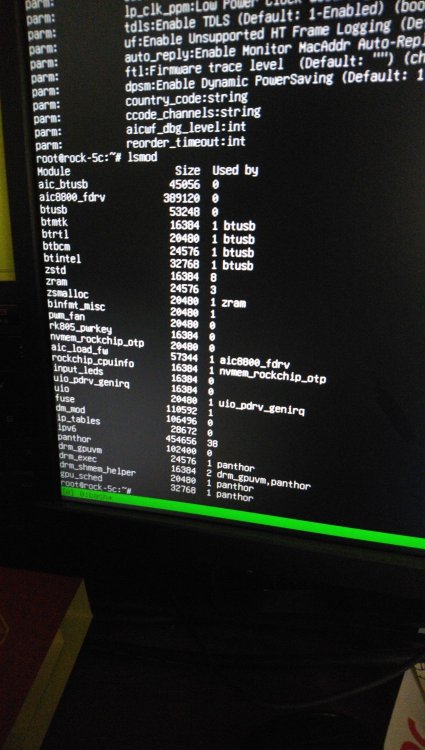
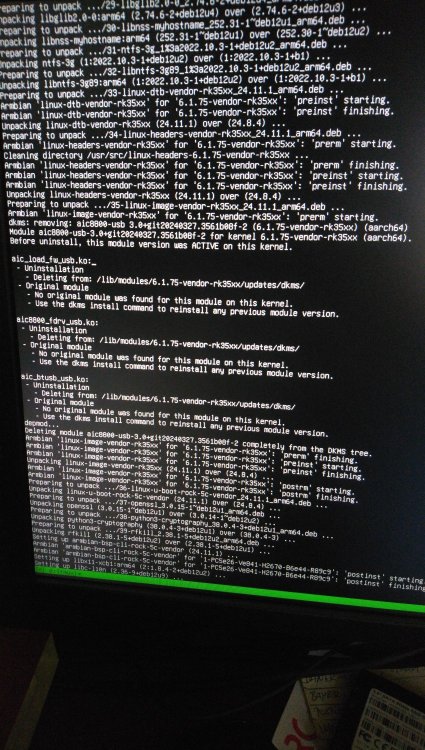
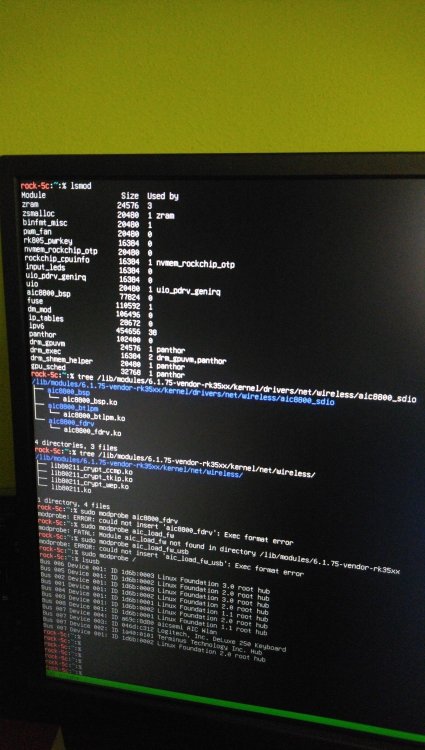
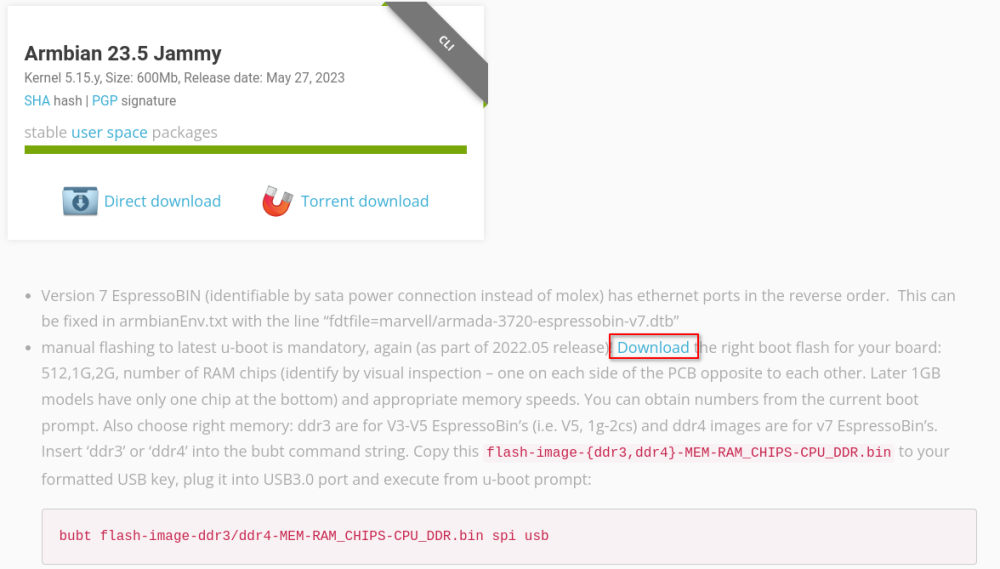
Rock 5C - WiFi stops working after system upgrade
in Radxa Rock 5C
Posted
dmesg found it.. but
[ 12.854279] usb 7-1.3: New USB device found, idVendor=a69c, idProduct=8d80, bcdDevice= 1.00
[ 12.854323] usb 7-1.3: New USB device strings: Mfr=1, Product=2, SerialNumber=3
[ 12.854353] usb 7-1.3: Product: AIC Wlan
[ 12.854378] usb 7-1.3: Manufacturer: aicsemi
[ 12.854403] usb 7-1.3: SerialNumber: 20220103
...
[ 14.555712] aicbsp_init
[ 14.555720] RELEASE_DATE:2024_0109_ec460377
[ 14.555724] aicbsp_resv_mem_init
[ 14.557550] systemd[1]: Starting systemd-sysusers.service - Create System Users...
[ 14.567717] aicbsp: aicbsp_set_subsys, subsys: AIC_WIFI, state to: 1
[ 14.567736] aicbsp: aicbsp_set_subsys, power state change to 1 dure to AIC_WIFI
[ 14.567741] aicbsp: aicbsp_platform_power_on